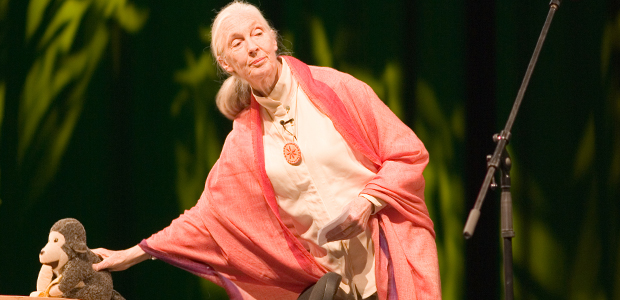Advertisement
Wildlife Wednesday: Jane Goodall Sows Seeds of Hope
Jane Goodall is well known as a chimpanzee expert (or primatologist, if we’re being official) with years of conservation work under her eco-friendly belt. She’s currently touring North America as part of the Unique Lives lecture series, and my co-worker Leah and I were thrilled to attend yesterday’s Vancouver event with fellow conservationists, including the … Continued

Jane Goodall is well known as a chimpanzee expert (or primatologist, if we’re being official) with years of conservation work under her eco-friendly belt. She’s currently touring North America as part of the Unique Lives lecture series, and my co-worker Leah and I were thrilled to attend yesterday’s Vancouver event with fellow conservationists, including the eco-friendly company Nature’s Path.
To no one’s surprise, Goodall was an amazing speaker. She brought up plenty of thought-provoking points about our role in preserving the planet’s flora and fauna—and shared some hilarious chimp anecdotes. Today, we’re going to use our usual Wildlife Wednesday format to discuss the event, as well as the wonderful work Goodall is doing to promote global activism.
Habitat
Although she now spends most of her time travelling around the globe and inspiring others, Goodall spent years in the forests of Gombe, Africa, nurturing her love of plants and animals and expanding the study of wild chimpanzees.
Trivia
- Goodall travels a mind-boggling 300 days per year to lecture and raise money for the Jane Goodall Institute.
- She is also known as Dr. Jane and Dame of the British Empire, a moniker bestowed by Queen Elizabeth in recognition of Goodall’s work with primates.
- Goodall was named a UN Messenger of Peace by Kofi Annan.
- She became a vegetarian after reading up on factory farming.
- Goodall’s work in Gombe proved that primates use tools. She first observed chimps’ tool-using talents when David (a chimp) used a piece of grass to “fish” for termites in a termite mound.
- Seeds of Hope, Goodall’s latest book, focuses on the importance of preserving plants and trees (as well as primates!).
Goodall’s four reasons for hope
Despite all the threats facing the planet, Goodall pointed out four key reasons why she has hope for the future.
- Kids these days are more globally aware than ever.
- Our collective intelligence will hopefully lead to innovations that allow us “to live in harmony with Mother Earth.”
- Nature is pretty resilient, as shown by all the conservation success stories we feature on Wildlife Wednesday (hello there, black-footed ferret).
- The human spirit is indomitable, and conservationists will continue to push for positive change.
How can we help?
- Get the kids in your life involved with Roots & Shoots, Goodall’s global youth program that encourages youngsters to flex their activist muscles.
- Donate to Roots & Shoots.
- Become a chimp guardian and receive an adorable chimp plush. Goodall proudly displayed her own chimp plush, Mr. H, at the lecture.
- Support the environment (and your health) by going meatless at least once a week.
- Make eco-friendly choices in your daily life. As Goodall pointed out, “the cumulative effect of the millions and billions of small, ethical choices we make every day can change the world.”





